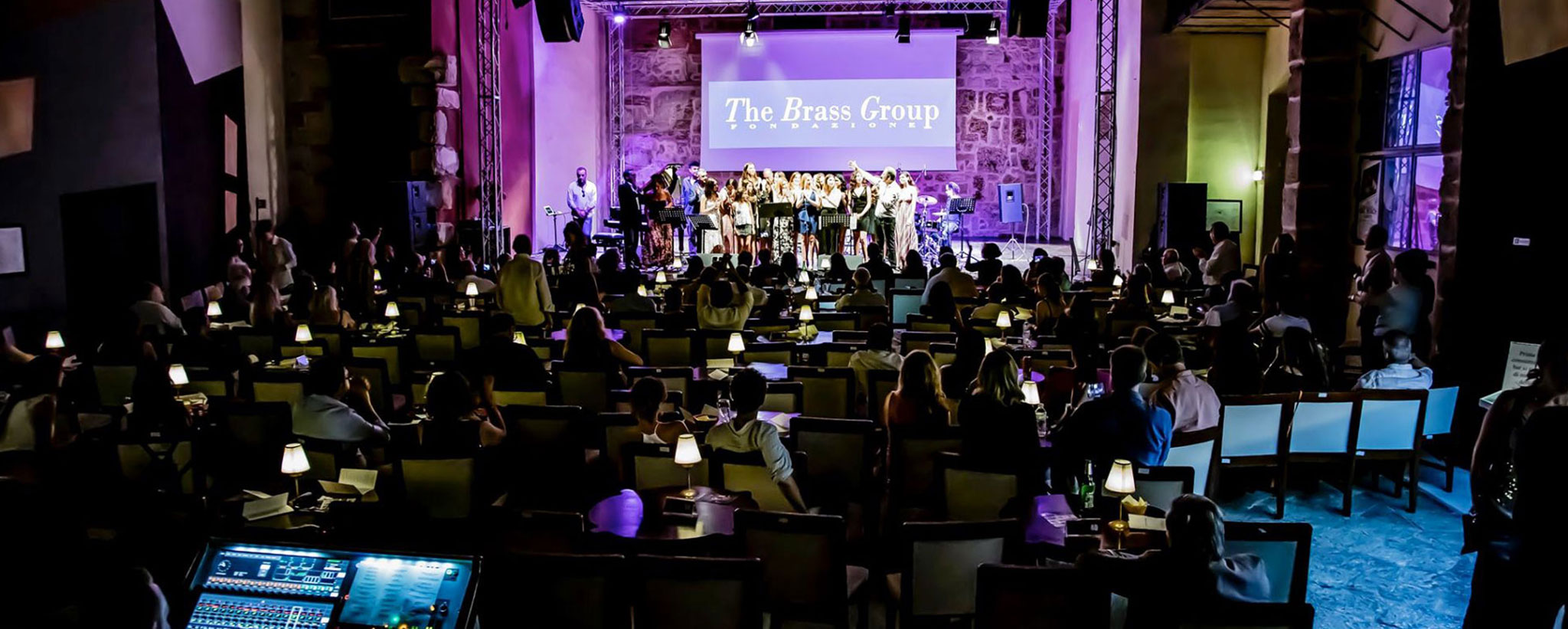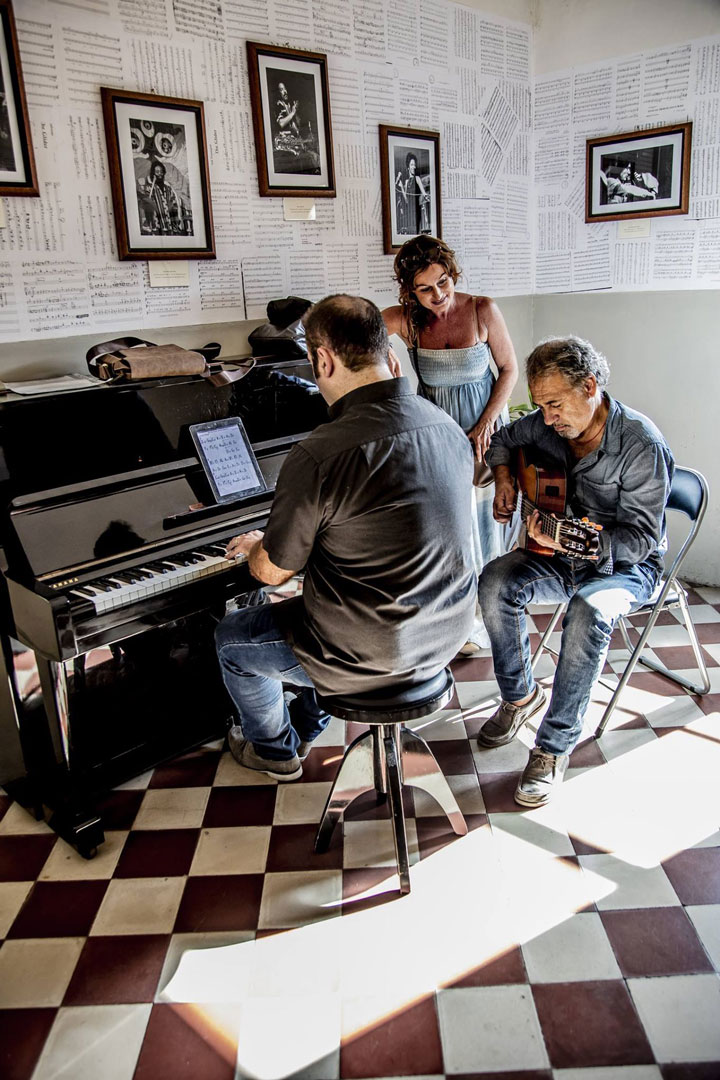Program
Objective
It supports the development of an educational orientation course on jazz, through an innovative approach to education. It is based on innovative interventions aimed at the promotion of Sicilian Jazz and formulated to stimulate and enhance the skills of individual learners towards a professional cultural path that starts from amateurism towards the potential professionalism, involving schools and institutions on various levels of cultural fruition.
We want to involve all the operators in the field, with particular attention to the area of physical, mental, and social distress.
The unifying factor remains and will remain the practice of jazz music.
On the other hand, the intuition of the importance of a strong involvement of students in an inclusive community vision is new, where able and disabled people find new spaces for integration and interaction, starting a stimulating group activity.
To experience jazz music in sensory dimensions with special education in schools, offering reception tools based on an innovative approach for emotional involvement, gratification, and the sense of self-esteem, that are certainly amplified. The ultimate goal of the service is to improve the quality of life of those involved in the areas involved.
Activities
The activities of the BRASS EDUCATIONAL service are based on a vision of sicilian jazz music as an added value for the student, whether or not he is able-bodied.
The offer of paths of knowledge of the Sicilian jazz heritage is possible through the musical documents kept in the Musical Studies Center (Centro Studi Musicali) of the Real Teatro Santa Cecilia.
The major innovation of the educational approach is based on the path that the students and teachers of the school are called to experience, an innovative research project (The Sensory Room) and the fruition of the musical environment for subjects in conditions of discomfort in schools (Special Educational Needs).
We intend to promote the idea of a community based on the principle of social sustainability, that is, the ability of the actors to intervene effectively together to ensure conditions of equally distributed human well-being, such as safety, health, education, for all social classes. In this respect, BRASS EDUCATIONAL proposes itself as an initiative aimed at carrying out activities addressed to all the students included in the 13-18 age group, in order to offer them the opportunity to “adequately” benefit from the Jazz musical heritage, as well as to know about the fascinating world that finds its roots in the ancient Sicilian band tradition.
The actions supported by the program are based on the creation of paths that combine interactive digital music workshops with preparatory modules for the knowledge of the Jazz tradition and, also, moments of socialization. The activities focus on the development of a path that allows students, in an inclusive dimension, to experience the reality of Sicilian jazz music directly within the Music School of The Brass Group Foundation, in an atmosphere of personal enrichment.
The program is divided into two projects:
- Brass day is an educational action based on experiential teaching. The school lives The Brass Group for a day, discovering the educational world of jazz music. The classes will experience an educational path inside the Monumental Complex of Santa Maria dello Spasimo, then, they will enter the heart of the activities of The Brass Group at the Real Teatro Santa Cecilia, with a proper excursion into the world of jazz music based on experiences, some of which are innovative, such as the Sensory Room. Everything will end with a concert where the kids will be involved.
- Brass educational is a genuine educational project for schools that allows the activation of a series of workshops and a preparatory guided tour towards jazz music that allows schools to live the experience of jazz music in an educational way.
The goal of the Foundation is to be an integral part of what are the educational offer plans of the schools, thus becoming real extracurricular courses.
In our program, we intend to take great care of interaction and inclusive dynamics in the school world, sharing projects, educational experiences and methodologies. In this respect, we have activated a project that is open to integrated working groups, made of experts and teachers, to create a didactic plan that integrates and supports the three-year educational offer of schools.
The new laboratories

Ensemble music workshop: “Anybody can play Jazz”. The module includes the creation of a musical workshop aimed at creating an ensemble for the performance at the concert. The idea is to use the attractive potentialities conveyed by music in order to support the awareness of the group in a collaborative dimension, proposing the realization of a product and the achievement of a goal. The success of the activity will not exclusively be related to the quality of the individual and collective performances that will be achieved, but to its emotional sphere, to the acquisition of the awareness of belonging to a community in which each one feels mutually important and is aware that the needs and objectives will be met and achieved with common commitment. Thus, it will be possible to observe the increasing self-esteem and trust in others.
Rhythmic Laboratory: The experience given by a rhythmic laboratory is that of a metaphorical journey to discover distant cultures, in this case the culture of jazz, hand-in-hand with the operator through the exploration of captivating rhythms and the improvisational element. These are the focal points of this new continuity project.
It has now been well established that music positively affects brain formation, increases intelligence, sensitivity and aesthetic sense.
Playing music promotes motor coordination, attention, concentration, logical reasoning, memory, self-expression, creative thinking.
Playing music that is derived from Jazz also favors the sense of grouping and an introspective work on how to approach and give order to one’s ideas, giving the people involved useful means not only in music, but in everyday life.
Support workshop: “The colors of Jazz” sees the kids as the protagonists of a workshop experience that aims to educate them on listening to jazz music and on graphic representation, through colors and drawings, of the emotions it arouses. Sound and color are then combined with rhythm, time, and space, so the musical experience gets to activate and develop some basic psychomotor and cognitive skills. Through continuous shifts between movement, sound, and sign, this musical activity appears as an opportunity for the learner to proceed with simple transformations between the different codes: sound, gestural, graphic and verbal; it thus directly points to the promotion and strengthening of the student’s elementary cognitive processes and proposes the musical experience as a real “mental organizer”.


